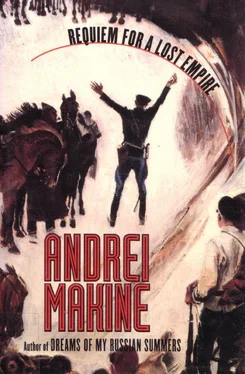Dolshanka, half depopulated during the war, did not notice his return. The village had been scoured by so many waves of armed men, Reds, Whites, anarchists, bandits pure and simple, and then Reds again, by so many lootings, fires, and deaths, that the villagers were no longer surprised at anything. There was just one old woman who asked him as he was passing in the street, "Tell me, soldier, is it true the Bolsheviks have abolished death?" Nikolai nodded.
Over several weeks, before the child was born, he had time to teach the young woman to read and write. It was perhaps the greatest pride of his life: he never boasted about rescuing her from the tomb but he enjoyed talking about the lessons he gave her in the evenings, after the wearisome labor of plowing. Thanks to his teaching she could tell him her first name, writing it out in capital letters: Anna. And choose a name for the child: Pavel. And sign the papers on the occasion of their marriage. A girlhood friend of Anna's, who came to see them at Dolshanka from time to time, quickly got used to these words, thoughts, questions or answers, traced on a sheet of paper or in the dust on a road. Her friend spoke with a slight accent. From the south, Nikolai reckoned. He told himself that his wife must have had the same lilting voice as this Sasha.
For his part, he did not need the angular letters to understand her. The work on the land, the silence of their house, the lives of the animals, none of this had any need of words. He and Anna would look at one another for a long time and smile. During the daytime, catching sight of one another from afar, they would wave, without seeing the expressions on one another's faces but picturing the tiniest detail.
The world around them was becoming more and more talkative. People held forth about work instead of working. They made decrees for the happiness of the people and let an old woman starve to death in her izba with its collapsed roof. Above all there was the one who talked about the workers, that young, scabby little muzhik they called Goldfish, on account of his red hair, who had never plowed a furrow in his life. And those who promised happiness, like that man, ageless, faceless, expressionless, you might have said, so pale and evasive were his eyes, that unfrocked monk, who chose to be called Comrade Krassny. This champion of happiness never smiled, included the word "kill" in every sentence, and displayed particular ruthlessness toward anything even remotely connected with the Church. When it came to it, the one Nikolai preferred to these two was the former sailor, Batum, an emissary of the town soviet who at least did not conceal his true nature. He robbed home distillers and drank himself, lived openly with two mistresses and, when the peasants challenged him, chorussing, "You have no right…" would drown their complaints with his merry croak, "Here's my right!" roaring with laughter and patting the enormous holster of the automatic pistol at his thigh. There were many more besides. They all called themselves "activists." They talked endlessly, made everyone listen to them, and would not let anyone else utter a word. Nikolai tried once, arguing with a speech by Comrade Krassny Goldfish exploded, his eyes contracted with anger, "We'll have to shorten your tongue, like your good wife's!" Nikolai lunged at him but came up against the barrel of the automatic pistol. Batum was drunk. He could well have fired it without even feeling the trigger beneath his finger. Nikolai walked out of the House of the Soviet. It had once been Count Dolshansky's home.
Sometimes, as the plow jolted slowly and ponderously along, Nikolai told himself that this whole new order of things was only a transient clouding of people's minds, comparable to the posturing of a drunkard. Yes, it was a kind of hangover that would one day come to an end of its own accord. How could they change essential things, all these prattlers in leather jackets? This Krassny, whose principal achievement 'was mobilizing activists to tear down the domes of churches in the vicinity of Dolshanka. Or Batum, whose repertoire of gestures, when he did not have a bottle in his hand, was limited to two: unbuttoning his fly and reaching for his revolver. Nikolai shook his head, smiled, leaned heavily on the handles of the plow. No, they were powerless against the course of this plowshare polished by the earth, against this earth, open in the expectation of seed, against this wind that still had a snowy chill but was already mingling with the warm exhalation of the plowed lands.
At other moments when he talked with the villagers, who grew increasingly wary of speaking about such things, or learned that yet another committee had been created (Committee of the Poor, Committee of the Godless, Committee of the Horseless-it seemed to him as if the activists invented a new one every day), Nikolai no longer felt this confidence in the solidity of things. He stopped at the end of the field to let Fox catch his breath and ran his eyes over the plain that sloped gently up toward the houses of Dolshanka, pictured all those people who, a few years before, during the war, had passed through these places, killing, dying, burning houses, raping women, torturing men, burying them alive in fields reverted to wilderness. Then he said to himself that this seed, nourished with so much blood, was bound to produce a good crop. And that perhaps the noisy efforts of the activists had a hidden force, whose meaning for the moment eluded him.
This force made itself manifest in the spring of 1928 in the same field amid the morning warmth of the same plowing. Without interrupting his slow progress behind the horse, out of the corner of his eye Nikolai observed the approach of four figures from the village: Goldfish, Krassny, Batum, and a stranger dressed in a long leather coat, no doubt an inspector eager to monitor the first steps taken toward collectivization. A group of activists, men and women, followed them some paces behind. Nikolai knew why they were coming. For several months now the talk in Dolshanka had been of nothing else. The posters pasted on the door of the soviet announced it clearly: the organization of a kolkhoz, a collective farm. The only obscure point in Krassny's declarations concerned sewing needles. The peasants had not fully understood if these had to be handed in to the kolkhoz, along with their animals and their tools. Some people, afraid of being suspected of opposing the Party's policies, had even brought their crockery to the soviet. Others were biding their time in the hope that this excess of madness would abate. Nikolai was of their number.
He finished the furrow and, when he reached the headland, stopped the horse and waited. Following the activists' progress across the field, he felt a choking rage that reminded him of a day long ago: disconsolate hostages gathered in a courtyard and that slim paper snake slithering out of the telegraphic apparatus to proclaim death. He had not slept a wink the night before, wrestling with thoughts that led nowhere. "Run away, taking the family with him? Burn the house down so as to leave nothing for those parasites? But run away where? In neighboring villages it's even worse, they're putting people in prison who own two horses. Into the forest? But how could we live there, with a child of eight, when the nights are still cold?" Picturing this escape, he saw the whole country peopled with activists, entangled in coils of ticker tape.
They were drawing close. Nikolai bent down, removed a tuft of dry grass that had become wrapped around the plowshare and, with his other hand, checked his secret store: in the rounded rut by the headland his fingers brushed against the handle of an ax. Now he felt free. No more reflection, no more hesitation. They would surround him, he would lean over, as if to change the angle of the plowshare, would seize the ax, would bring it down on Batum, then on the inspector. Goldfish, the most cowardly, would try to escape. Krassny, incapable of action, would start yelling. He felt as if his head were enveloped in icy, liquid glass. With hallucinatory precision he saw the gleam of a turned furrow, a black beetle scurrying along, climbing onto his boot. The wind stirred for a moment and he could hear the words, still indistinct, of the people coming toward him.
Читать дальше










